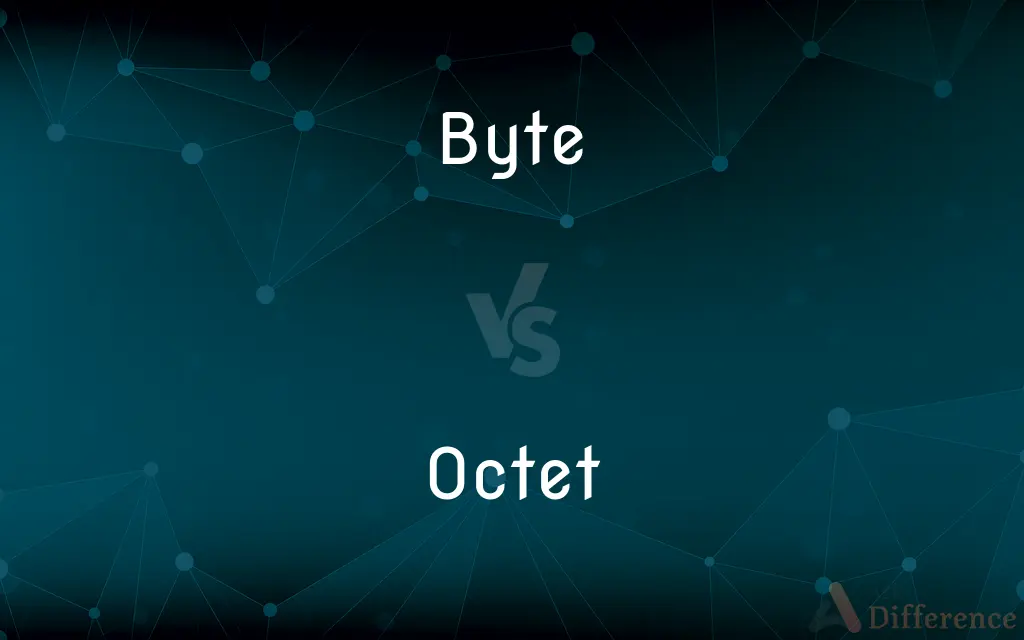Byte vs. Octet — What's the Difference?
By Tayyaba Rehman & Maham Liaqat — Updated on March 25, 2024
A byte typically refers to 8 bits in most computer systems, while an octet is strictly 8 bits, emphasizing clarity in telecommunications and computing contexts.

Difference Between Byte and Octet
Table of Contents
ADVERTISEMENT
Key Differences
Bytes and octets are fundamental units in computing and telecommunications, both representing groups of bits, which are the smallest units of data in computing. A byte is commonly used to denote a sequence of bits used to encode a single character of text in a computer or other digital devices. While it usually consists of 8 bits, historically, the size of a byte could vary depending on the hardware. An octet, on the other hand, is strictly defined as a collection of 8 bits, with no ambiguity about its size. This distinction is crucial in fields like network engineering, where precision in data size specification is essential.
Bytes are more widely recognized in general computing contexts, where they serve as a basic measure for data size and memory capacity. Software development, file sizes, and storage capacities are typically discussed in terms of bytes. This term has become deeply ingrained in the computing lexicon, symbolizing a standard chunk of data for various operations and measurements. Octets, while universally consisting of 8 bits, are prominently used in network engineering and telecommunications. They are preferred in these domains to avoid any confusion that might arise from the historical variability of the byte's size, ensuring clear communication about data transmission and protocol specifications.
In practical applications, when discussing storage capacity, data size, or memory, bytes are the standard unit of measurement. Operating systems, applications, and most consumer-level computing devices report sizes in bytes. This has led to familiar terms like kilobytes (KB), megabytes (MB), and gigabytes (GB), which are entrenched in everyday language when referring to digital data volumes. Octets find their primary application in the precise technical specifications of data transmission rates and network protocols. Terms such as "octet-stream" signify data transfers where the fundamental unit of data packet size is understood to be exactly 8 bits, which is vital for ensuring compatibility and performance across diverse network technologies.
Despite these differences, in many contexts, especially where precision is not as critical, the terms byte and octet are used interchangeably. This is largely due to the overwhelming prevalence of 8-bit bytes in modern computing architectures. As such, for most practical purposes, a byte and an octet can be considered equivalent, particularly in contexts where data sizes and capacities are discussed without the need for technical specificity. However, in telecommunications and certain areas of computing where exactness is paramount, distinguishing between bytes and octets helps avoid potential ambiguity, ensuring clarity and accuracy in technical documentation and specifications.
Comparison Chart
Definition
A unit of digital information traditionally representing 8 bits but historically variable.
Strictly a collection of 8 bits, with no variation.
ADVERTISEMENT
Usage Context
General computing, software development, storage.
Network engineering, telecommunications.
Historical Variability
Could vary depending on the computer architecture.
Always exactly 8 bits.
Common Applications
Encoding text, measuring file sizes and storage capacity.
Specifying data packet sizes in network protocols.
Precision
Generally understood as 8 bits but historically not always precise.
Always used to denote a precise quantity of 8 bits.
Compare with Definitions
Byte
Storage measurement.
The document is 45,000 bytes in size, indicating its storage requirement.
Octet
Network protocol specification.
Data packets are defined in terms of octets to ensure precision.
Byte
File size unit.
The photo file is 2 megabytes, detailing its quality and storage space used.
Octet
Telecommunications data unit.
The protocol requires headers to be a certain number of octets.
Byte
Unit of digital information.
A single ASCII character, like 'A', is stored as one byte in a computer system.
Octet
Exact data size unit.
The encryption algorithm operates on 128-octet blocks.
Byte
Memory capacity unit.
This computer has 8 gigabytes of RAM, indicating its multitasking capability.
Octet
Binary data measurement.
The file begins with a 16-octet header, specifying format information.
Byte
Data transfer rate unit.
The internet speed is measured in megabytes per second.
Octet
Fixed-size data unit.
Each IP address segment is represented by an octet.
Byte
The byte is a unit of digital information that most commonly consists of eight bits. Historically, the byte was the number of bits used to encode a single character of text in a computer and for this reason it is the smallest addressable unit of memory in many computer architectures.
Octet
A composition for eight voices or eight instruments.
Byte
A unit of data equal to eight bits. Computer memory is often expressed in megabytes or gigabytes.
Octet
A group of eight singers or eight instrumentalists.
Byte
A set of bits constituting the smallest unit of addressable memory in a given computer, typically eight bits.
Octet
A group of eight
"A train of heavy wagons rumbled north on the Winnipeg Trail, drawn by octets of oxen" (Garrison Keillor).
Byte
(computing) A short sequence of bits (binary digits) that can be operated on as a unit by a computer; the smallest usable machine word.
Octet
See octave.
Byte
A unit of computing storage equal to eight bits, which can represent any of 256 distinct values.
The word “hello” fits into five bytes of ASCII code.
Octet
A set of eight valence electrons in an atom or ion, forming a stable configuration.
Byte
A sequence of 8 bits (enough to represent one character of alphanumeric data) processed as a single unit of information
Octet
A group or set of eight of something.
Octet
(music) A group of eight musicians performing together.
An octet of waiters sang her "Happy Birthday".
Octet
(music) A composition for such a group of musicians.
Octet
(computing) A byte of eight bits. Abbreviation: o
Octet
A group of three bits, representing any of eight possible values.
Octet
A composition for eight parts, usually for eight solo instruments or voices.
Octet
A group of eight singers or eight musicians.
Octet
The cardinal number that is the sum of seven and one
Octet
Eight performers or singers who perform together
Octet
A set of eight similar things considered as a unit
Octet
Eight people considered as a unit
Octet
A musical composition written for eight performers
Common Curiosities
What is a byte?
A byte is a unit of digital information that typically represents 8 bits, used in computing for data storage and encoding text.
How does the historical variability of a byte differ from an octet?
Historically, the size of a byte could vary by architecture, whereas an octet has always been exactly 8 bits.
What units are derived from bytes for larger data sizes?
Kilobytes, megabytes, gigabytes, and terabytes are derived from bytes to measure larger data volumes.
Can bytes and octets be used interchangeably?
In many practical contexts, especially where precision is not critical, bytes and octets are used interchangeably as both usually represent 8 bits.
Is knowledge of octets necessary for everyday computer use?
For general users, understanding bytes is sufficient, but knowledge of octets can be essential for networking professionals.
What is an octet?
An octet strictly refers to a collection of 8 bits, used for precision in telecommunications and network engineering.
In what context is a byte commonly used?
Bytes are used in general computing, particularly for measuring file sizes, storage capacity, and data transfer rates.
Why are octets important in network engineering?
Octets provide precision and clarity in specifying data packet sizes in network protocols, crucial for compatibility and performance.
How are bytes used in software development?
Bytes are fundamental in encoding data, managing memory, and defining file sizes in software applications.
What is meant by a 16-octet header in computing?
It refers to a header segment in a file or data packet that is exactly 128 bits (16 bytes) in size.
How do bytes affect computing performance?
The amount and management of bytes (in RAM, storage, etc.) directly influence a computer's performance and capability.
How is data transfer speed related to bytes?
Data transfer speeds in computing are often measured in bytes per second, affecting how quickly information is transmitted.
Why might someone prefer to use the term octet over byte?
To avoid ambiguity and ensure precision in technical specifications, especially in telecommunications.
Are there any situations where a byte does not equal 8 bits?
Historically, yes, in some computing systems a byte was not 8 bits, but today it is almost universally 8 bits.
Share Your Discovery

Previous Comparison
Brash vs. Rash
Next Comparison
Proud vs. PrideAuthor Spotlight
Written by
Tayyaba RehmanTayyaba Rehman is a distinguished writer, currently serving as a primary contributor to askdifference.com. As a researcher in semantics and etymology, Tayyaba's passion for the complexity of languages and their distinctions has found a perfect home on the platform. Tayyaba delves into the intricacies of language, distinguishing between commonly confused words and phrases, thereby providing clarity for readers worldwide.
Co-written by
Maham Liaqat













































